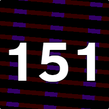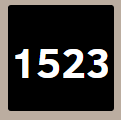/prīm/
Writing the wrong year is a January ritual for many of us, and we all have our own ways of dealing with it. I had a co-worker once who, every January, would diligently practice writing out the correct date on a piece of scrap paper. After writing the date 25 times or so, she said, she would have fully retrained herself and could be reliably correct for the rest of the year.
And then there was the college roommate who at the start of each year would put her clothes away in the dorm room dresser and then quiz herself on which drawer held what. “Socks!” she would say, pointing at a drawer and then opening it to check; she repeated this routine until she was reliably perfect. Apparently she found the momentary disorientation of opening what she thought was an underwear drawer and finding T-shirts instead unpleasant enough to warrant preventative measures.
I have never gone to such lengths myself, but I do usually come up with some kind of mnemonic about the new year, which I then recall 15 seconds AFTER writing the wrong date on something. This time around I noticed that 2017 has the distinction of being prime, in that 2,017 has no factors other than itself and 1. The last prime year was 2011, the next one won’t be until 2027.**
| So this seems a prime time to consider prime. It is borrowed from the Latin prīmus, meaning “the first” or “the earliest.” Prīmus came from *prismos, which was the superlative of PIE *preis- (“before”)—so basically, “firstest.” From “firstest” we also get related meanings like “excellent,” “most notable,” and “of high quality”—and thence words like primer (as in a first coat of paint) and primer (as in an elementary textbook or first reader), as well as premier and primary and primordial and prim. The English term “prime number” entered the language in the 1560s, as a translation of the Euclidean term πρῶτος ἀριθμός (protos arithmos). Protos, it turns out, comes from the same root as prīmus, and has much the same meaning of “firstest” (see, for instance, words like proton, prototype, and protoplasm). So calling these numbers prime makes sense in terms of literal translation. |
And yet, as I muddle along, mislabeling invoices, I find myself considering the murky waters between first and best and how easily we elide the difference between them. Prime time, for example, used to mean simply springtime, the first season of the year; only later, with the advent of broadcast television (and ratings) did it come to mean the peak or most popular time for viewing.
Is firstest necessarily bestest? My date-rehearsing colleague and my drawer-memorizing roommate would probably say it is. They were best-foot-forward types, always on top of things, no false starts.
The year is young, they might say. Put on your socks and get it right the first time.
Happy 2̶0̶1̶6̶ 2017, everyone!
* I do not want to have to wrangle with an automated university disbursement system that reads the wrong date and decides not to process payment because the work predates the purchase order. At times like that I wonder whether it would work better if the machines just talk to each other without involving us messy and fallible humans—but wait, no, that sounds like the setup for Skynet and the Machine Wars and any number of similarly dystopian futures. Do not support.
**The prime numbers wiki (there is such a thing because of course there is!) informs me that after 2027 we will have to wait only two years until the next prime year since 2,027 and 2,029 are “twin primes”—prime numbers that are only two numbers apart, like 3 and 5, or 29 and 31. Apparently this phenomenon is very interesting, but I can’t tell you much beyond the fact that twin primes exist and that it is generally believed [though as yet formally unproven] that there are infinitely many such pairs.




 RSS Feed
RSS Feed